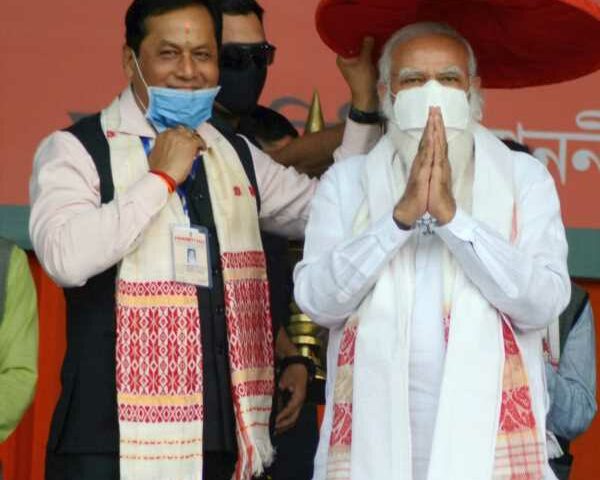While Himanta Biswa Sarma scotched rumours that he would be the king this time, political sources in Guwahati maintained that he, and not Chief Minister Sarbananda Sonowal, had a bigger say in choosing candidates, reports Radhika Ramaseshan.
It is evident by now that Sarbananda Sonowal, chief minister of Assam, can be denied a second term in office if the Bharatiya Janata Party and its allies win the assembly polls.
“The BJP has a well-laid rule — the parliamentary board will decide on chief minister after the elections,” stated Himanta Biswa Sarma, senior Assam minister and key northeast strategist of Amit Shah, Union home minister.
Sarma, who has been re-nominated from the Jhalukbari constituency, scotched rumours that he would be the king this time. But, political sources in Guwahati maintained Sarma, and not Sonowal, had a bigger say in choosing candidates. “There is no smoke without fire,” said a source.
A senior BJP leader said in 2016, after the BJP secured a big mandate in Assam for the first time, its leaders took the unusual step of nominating Sonowal, who is from the Sonowal Kachari tribe, as CM, although he had joined the BJP only in 2011, from the Asom Gana Parishad.
“The BJP doesn’t normally go for a person from outside the Sangh Parivar. But Sonowal was then an icon. The anti-foreigner (read Bangladeshi) movement had cast its shadow on the elections because of the perception that the Congress encouraged Muslim infiltration in its 15-year rule,” the source said.
Sonowal challenged the Illegal Migrants (Determination by Tribunal) Act, enacted by the Centre in 1983. Although the law prescribed procedures to detect the “illegal” immigrants from Bangladesh, it accorded “protection” to those who were “victimised” by the Assam movement and made deportation difficult. Sonowal won a battle when the Supreme Court struck down the Act. “But he failed to build political capital for himself and the BJP,” the source commented.
There could be a grain of truth in the leader’s remark because the BJP’s Rajya Sabha MP and former Congressman Bhubaneswar Kalita stressed the “inclusive benefits to all sections” flowing from the Centre’s welfare schemes would be the BJP’s theme song. Kalita was largely silent about Sonowal’s governance — “It’s development all the way. For the first time, there are no middlemen to deprive our people of their rights and benefits because of the direct bank transfer mechanism.”
The only state-related achievement he flagged was the distribution of unlimited free rice to 5.8 million people covered by the National Food Security Act and 5 kg rice per member from families without ration cards.
However, the Congress has also tried to batten down the hatches ahead of a difficult election. After ruling for 15 years, the party slid to 26 seats in the 126-member assembly in 2016, against the BJP’s 60. The BJP continued its winning streak in the 2019 Lok Sabha polls.
The Congress has since banded together with the All India United Democratic Front, led by Badruddin Ajmal, the Bodoland People’s Front (a former BJP ally), the Communist Party of India-Marxist, the Communist Party of India-Marxist- Leninist), and the Anchalik Gana Morcha into a Mahajot or grand alliance. It assigned the charge of electioneering to Bhupesh Baghel, Chhattisgarh CM, and will focus on the Citizenship Amendment Act, price rise, and unemployment. The Congress has decided to invest in the seats identified as “winnable” and augment its booth workforce.
The BJP waved aside the Congress’s endeavour. “The Congress is a runner-up. It’s no doubt cobbling alliances but on the ground, the situation remains unchanged. We have consolidated the Hindu votes,” claimed Biswa Sarma.
The polarisation argument is premised on the belief that while the Congress’s tie-up with the AIUDF, an entity that represents the Bengali-speaking Muslims and is dominant in large parts of Lower Assam and Barak Valley, can bring the Muslim votes together, it may trigger a reverse consolidation of the Hindu votes. Rajdeep Roy, Silchar MP, played down the alliance’s impact even in Barak Valley. “In the Lok Sabha election, the Congress and the AIUDF had a tacit seat-sharing arrangement but they lost most seats,” said Roy.
Assam BJP president and Sorbhog MLA Ranjeet Kumar Dass picked out the seats in Upper Assam which the Congress won in 2016 and now finds “hard to defend”: Sarupathar, Golaghat, Titabhar (former CM Tarun Gogoi’s constituency), Mariani, Nazira, Sibsagar and Doomdooma.
“Everybody, the caste Hindus, Ahoms, and the tribals are afraid of Ajmal ruling Assam if there’s a Congress-AIUDF government and he is made home minister. The same is true for Lower Assam and Barak Valley. At best, there will be a fight in two or three seats,” Dass maintained.
Tezpur MP Pallab Lochan Das sounded more realistic. He acknowledged the Congress’s alliance with the BPF could affect the BJP’s prospects in the Bodo Territorial Council which it swept in 2016 with the BPF.
In December 2020, when elections to the BTC were held, no party secured a majority, although the BPF was the single largest entity.
The BJP snapped its five-year partnership with the BPF, and acquired the Gana Suraksha Party, the second-largest party in the BTC, and the United People’s Party Liberal as its allies and formed the BTC’s governing executive. Later, elected members of the GSP joined the UPPL.
“The BPF is still dominant. This is why even Dass had to abandon his previous seat and move to Patacharkuchi,” a source said.
As for the vastly tweaked CAA, the BJP has been curiously silent about it after it provoked adversarial reactions from the caste Hindus, Ahoms and tribals who feared that the statute was designed to encourage a fresh influx of Bangladeshi Hindus.
“We convinced our voters despite the CAA, even Bangladeshi Hindus can’t get citizenship just like that, unless they prove with documents that they were harassed in their places of origin,” said Dilip Saikia, BJP general secretary and Mangaldoi MP.
Source: Read Full Article

